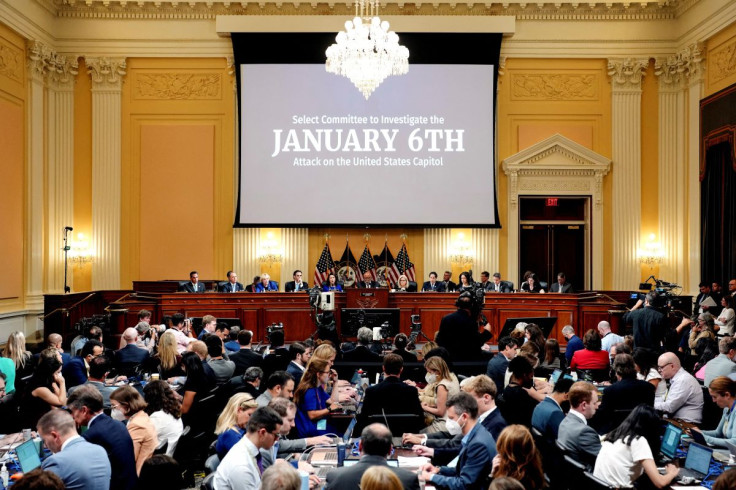Trump's Response To Jan. 6 U.S. Capitol Riot In Focus At Hearing

Donald Trump's response, or lack of it, during the three-hour-long assault on the U.S. Capitol by his supporters on Jan. 6, 2021, was in focus on Thursday as the last of a summer series of hearings on the attack got underway.
The hearing, expected to be the last for many weeks, was to detail both the violence that played out as Trump supporters fought their way into the Capitol and Trump's actions in the 187 minutes between his speech urging the crowd to "fight like hell" and the final release of a video urging rioters to go home.
But the president did not call on the crowds to go home for more than three hours, after the attack caused several deaths, injured more than 140 police officers and delayed certification of Democratic President Joe Biden's election.
"Over the last month and a half, the select committee has told a story of a president who did everything in his power to overturn an election. He lied, he bullied, he betrayed his oath," the committee's Democratic chairperson, Representative Bennie Thompson, said via a remote video feed after being diagnosed with COVID. "He tried to destroy our democratic institutions. He summoned a mob to Washington."
Thompson described how Trump did not leave his dining room table to send his followers home, despite pleas from some of his closest advisers, including his daughter Ivanka and son Don Jr.
Trump remains highly popular among Republican voters and continues to flirt with the possibility of running for president again in 2024. But a Reuters/Ipsos poll concluded on Thursday found his standing among Republicans has weakened slightly since the hearings began early last month. Some 40% of Republicans now say he is at least partially to blame for the riot, up from 33% in a poll conducted six weeks ago, just as the congressional hearings were getting underway.
Scheduled during the evening to reach a broad television audience, the public hearing is expected to be the last of eight this summer by the House of Representatives Select Committee. Another round of hearings will begin in September, said the panel's Republican vice chair, Representative Liz Cheney.
The witnesses in the room were Matthew Pottinger, a deputy national security adviser under Trump, and Sarah Matthews, a deputy press secretary in his White House. Both resigned following the riot.
The panel of seven Democratic and two Republican House members has been investigating the attack for the past year, interviewing more than 1,000 witnesses and amassing tens of thousands of documents.
It has used the hearings to build a case that Trump's efforts to overturn his defeat by Biden in 2020 constitute illegal conduct, far beyond normal politics.
PENCE, MILITIAS AND FRAUD ALLEGATIONS
Questioning of witnesses will be led by Kinzinger and Democratic Representative Elaine Luria.
Committee aides declined to name witnesses, citing security concerns, but according to media reports they will include Matthew Pottinger, a deputy national security adviser under Trump, and Sarah Matthews, a deputy press secretary in his White House. Both resigned following the riot.
Previous hearings have focused on the run-up to the riot, Trump's pressure on Vice President Mike Pence to deny Biden victory, militant groups whose members participated in the Capitol attack, and Trump's interactions with close advisers questioning his false allegations of massive voter fraud.
Committee members said Trump incited the riot by refusing to admit he lost the election and through comments including a Twitter post in December calling supporters to Washington for a "big protest" on Jan. 6, saying, "Be there, will be wild."
Trump denies wrongdoing and continues to claim falsely that he lost because of widespread fraud.
Trump and his supporters - including many Republicans in Congress - dismiss the Jan. 6 panel as a political witch hunt, but the panel's backers say it is a vital probe into a violent threat against democracy.
The attack on the Capitol injured more than 140 police officers and led to several deaths. More than 850 people have been charged with taking part in the riot, with more than 325 guilty pleas so far.
© Copyright Thomson Reuters {{Year}}. All rights reserved.



















